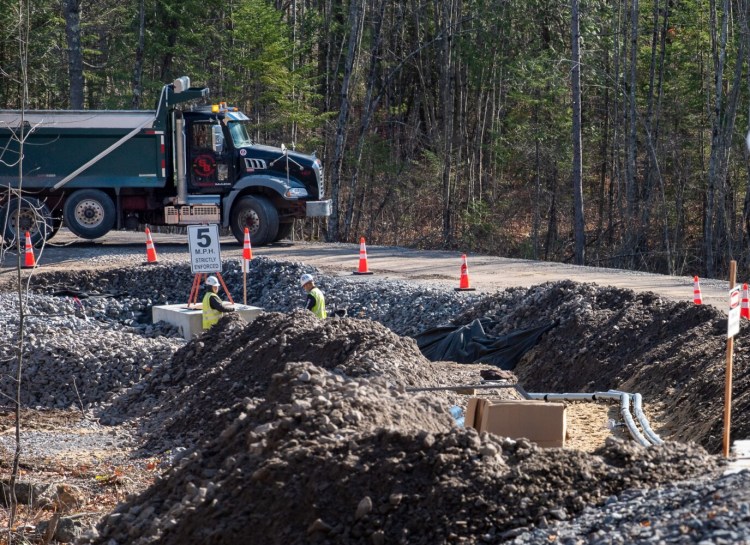LEWISTON — Voters in Maine soundly rejected the New England Clean Energy Connect project Tuesday, but on the ground in Lewiston, the hum of construction vehicles and machinery was continuing Wednesday.
At least for now, construction proceeds on the $250 million converter station in Lewiston — a central piece of the embattled transmission line project — despite Maine residents passing a referendum to ban “high-impact electric transmission lines in the Upper Kennebec Region.”
Several Lewiston officials were still assessing Wednesday what the vote could mean for a project that has promised a big financial benefit to the city, including Mayor Mark Cayer, who said he was “disappointed” by the results.
“I think it sets a terrible precedent and sends a terrible message to businesses large and small,” he said Wednesday.
The converter station, which is off an access road at 1651-1653 Main St., is designed to convert and transmit hydropower from Quebec into the New England grid. Lewiston’s role in the project has been widely supported by elected and city officials due to its revenue. The city is expecting to see roughly $3 million in taxes from the project this fiscal year, rising to a projected $7 million a year by the time the station is operational.
However, even after receiving $1.55 million already this year, along with Lewiston and Auburn officials campaigning against Question 1, the referendum was still supported by Lewiston voters Tuesday by a tally of 4,493 to 3,483.
“Mostly, I think we had an opportunity to have hydropower flow into our regional grid, which would have made a difference,” Cayer said. “Although I do not believe this is the end and I suspect some legal questions will need to be settled in the courts, all of that will be outside of the city’s purview.”

Work continues Wednesday morning on the access road for the $250 million converter station on outer Main Street in Lewiston that is nearly 80% finished. It’s a central piece of the embattled New England Clean Energy Connect transmission line project by Central Maine Power. Russ Dillingham/Sun Journal
Lincoln Jeffers, director of economic and community development, said election night was “disappointing indeed.”
“It’s been a long few years, but those opposed to the corridor got out early and were consistent in their messaging,” he said. “It was easily conveyed and built on old resentments about the (Massachusetts/Maine) relationship. (Central Maine Power’s) challenges over the last few years also left them open to payback for more recent resentments.”
Jeffers said he had not yet been in contact with NECEC officials following the vote, but said he expected construction on the converter station to continue until either the state or courts ruled otherwise.
Asked about the results Wednesday, Lewiston Mayor-elect Carl Sheline, who supports the transmission line, said, “There was a lot of emotion wrapped up in yesterday’s vote and I understand the corridor is a tough sell to the people of Maine.”
The word “disappointed” was also used by NECEC officials Wednesday, who vowed to continue the fight for the transmission line. Later in the day, the company filed a lawsuit in Maine Superior Court in Portland challenging the constitutionality of Question 1.
Based on Tuesday’s results, supporters of the winning Yes On 1 campaign called on the Maine Department of Environmental Protection to suspend NECEC’s construction permit, but the NECEC lawsuit asks the court for an injunction “preventing retroactive enforcement of the initiative against the project, so that ongoing time-sensitive and essential construction is not disrupted while this lawsuit proceeds before the courts.”
The tax payments received by Lewiston so far allowed the city to lower the property tax rate by $1.41 per $1,000 of assessed valuation. City officials have laid out loose plans to also use the revenue to reinstate programs that were cut long ago.
However, it’s unclear what would happen if the project was ultimately killed, eliminating the need for the converter station. The tax revenue gained by Lewiston so far is tied to new valuation from the station, but if the station were ultimately removed, at least some of that value could go away.
Asked last month, City Administrator Heather Hunter said there’s no specific measure that would repeal the work that’s already been done, meaning she expects the tax impact gained by Lewiston so far would “stay on the books.”
Send questions/comments to the editors.




Success. Please wait for the page to reload. If the page does not reload within 5 seconds, please refresh the page.
Enter your email and password to access comments.
Hi, to comment on stories you must . This profile is in addition to your subscription and website login.
Already have a commenting profile? .
Invalid username/password.
Please check your email to confirm and complete your registration.
Only subscribers are eligible to post comments. Please subscribe or login first for digital access. Here’s why.
Use the form below to reset your password. When you've submitted your account email, we will send an email with a reset code.